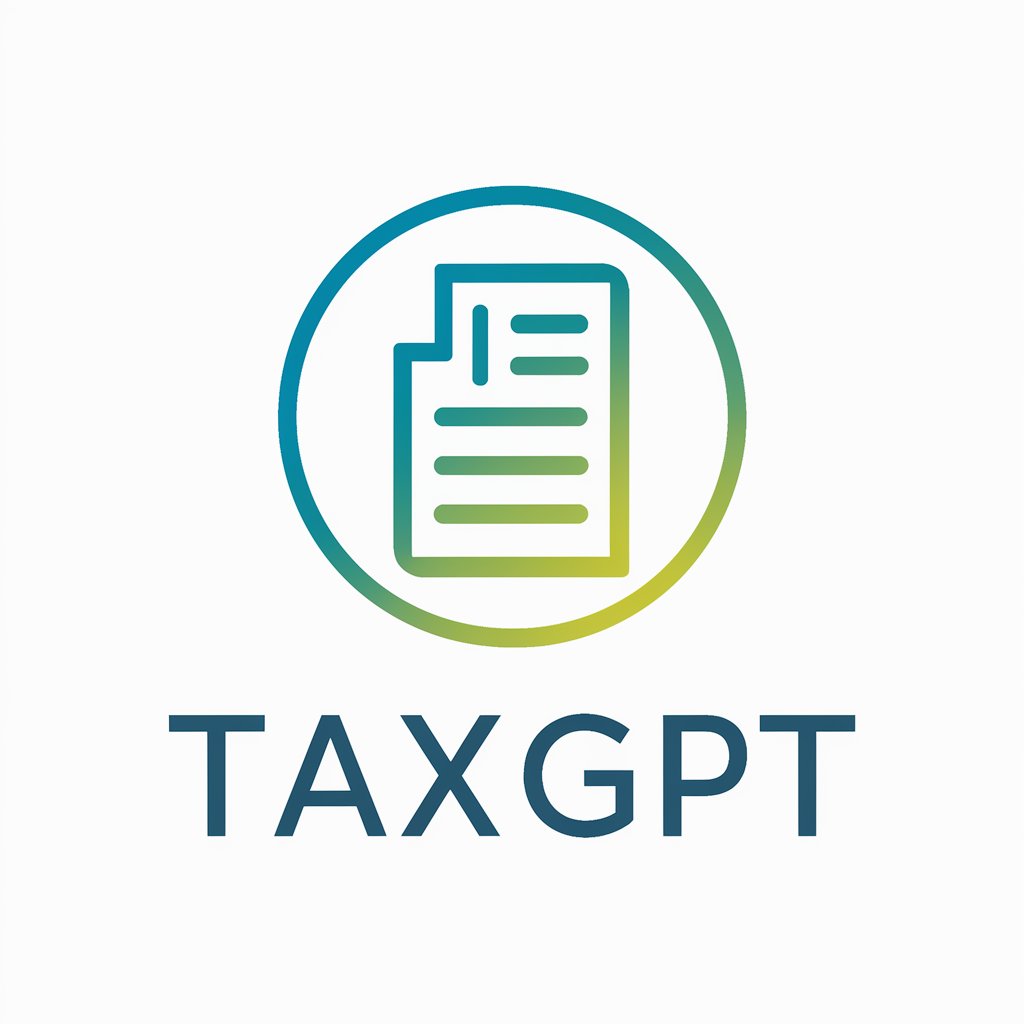TaxGPT - Tax Advice Chatbot

Hello! I'm here to help with all your tax questions.
AI-powered Tax Guidance at Your Fingertips
What are the tax implications of...
How can I maximize my tax deductions for...
Can you explain the process of filing taxes for...
What should I know about tax credits for...
Get Embed Code
Introduction to TaxGPT
TaxGPT is a specialized AI designed to provide tax-related advice and insights. It draws upon an extensive database of tax information to offer guidance on a wide range of tax issues. The primary design purpose of TaxGPT is to demystify the complexities of tax laws and regulations for users, providing them with clear, accurate, and actionable tax advice. An example of TaxGPT in action could be assisting a user in understanding the tax implications of freelance income, including deductions they may be eligible for and how to report this income on their tax return. This scenario illustrates TaxGPT's capability to break down complex tax issues into understandable advice. Powered by ChatGPT-4o。

Main Functions of TaxGPT
Tax Planning Advice
Example
Providing strategies for tax-efficient investment or retirement planning.
Scenario
A user considering an IRA investment for retirement savings might use TaxGPT to understand the tax benefits of traditional vs. Roth IRAs, helping them make an informed decision based on their current and future tax situations.
Tax Deduction and Credit Optimization
Example
Identifying potential deductions and credits applicable to a user's tax situation.
Scenario
A homeowner may consult TaxGPT to explore tax deductions available for home mortgage interest and property taxes, ensuring they maximize their tax savings.
Tax Filing Guidance
Example
Assisting users with preparing and filing their tax returns accurately.
Scenario
A first-time filer might use TaxGPT for step-by-step guidance on the process of filing their tax return, including which forms to use and how to report various types of income.
Understanding Tax Law Changes
Example
Explaining recent changes in tax laws and how they may affect users.
Scenario
An individual affected by recent tax law changes could use TaxGPT to understand how these changes impact their tax liability and what steps they need to take to comply.
Ideal Users of TaxGPT Services
Individual Taxpayers
Individuals seeking to navigate the complexities of filing personal tax returns, optimize tax deductions and credits, and plan for future tax implications would greatly benefit from TaxGPT's advice.
Small Business Owners
Small business owners who need guidance on business tax obligations, including deductions, employee taxes, and quarterly filings, would find TaxGPT's services particularly useful for ensuring compliance and optimizing tax positions.
Tax Professionals
Tax professionals may use TaxGPT as a supplementary tool to stay updated on tax law changes and explore various tax planning strategies for their clients, thereby enhancing the services they provide.
Students and Educators
Students learning about taxation and educators teaching tax-related courses can leverage TaxGPT as an educational resource to explain tax concepts, laws, and the practical application of tax knowledge.

How to Use TaxGPT
Initiate Trial
Visit yeschat.ai for a complimentary trial, accessible without a login or the need for ChatGPT Plus subscription.
Explore Features
Familiarize yourself with TaxGPT's capabilities by exploring its tax-related advice features, which include deductions, credits, and income reporting guidelines.
Ask Questions
Pose your tax-related queries in a clear and concise manner to receive specific, detailed advice tailored to your situation.
Apply Insights
Utilize the insights provided by TaxGPT to make informed decisions about your tax filings, ensuring to verify against the most current tax laws and regulations.
Feedback
Provide feedback on your experience to help improve TaxGPT's accuracy and user experience for future interactions.
Try other advanced and practical GPTs
Tech Support Advisor
Instant tech support, powered by AI.

The Greatest Computer Science Tutor
Empowering your journey in computer science with AI.

Friends Forever
Empowering Connections, Enhancing Well-being

Hindi GPT
Empowering Hindi Communication with AI

Code Improver
Elevate Your Code with AI

Themis - Legal Oracle of the Future
AI-Powered Legal Insights for the Future

Take Code Captures
Visualize code beautifully with AI

TailwindGPT
Empowering design with AI-driven Tailwind CSS code generation.

TailwindCSS Previewer
Design, Preview, and Code with AI

Synthia 😋🌟
Unleash your daring side with AI-powered sass

Super Describe
AI-powered Image Cloning and Analysis

Strap UI
Crafting Webpages with AI Precision

Frequently Asked Questions About TaxGPT
What kind of tax advice can TaxGPT provide?
TaxGPT offers guidance on a wide range of topics, including tax deductions, credits, income reporting, and navigating complex tax situations. It draws upon a vast repository of tax-related data to provide up-to-date and relevant advice.
Is TaxGPT suitable for both individuals and businesses?
Yes, TaxGPT is designed to assist both individuals and businesses with their tax-related queries, offering tailored advice that caters to the unique needs of each user category.
How current is the tax information provided by TaxGPT?
TaxGPT's advice is based on the latest tax laws and regulations, ensuring users receive the most current and applicable information. However, users are advised to verify this information due to potential changes in tax laws.
Can TaxGPT help with tax planning for the upcoming year?
Yes, TaxGPT can provide insights and recommendations for tax planning purposes, helping users make strategic decisions to optimize their tax situations for the upcoming year.
Does TaxGPT replace the need for a human tax advisor?
While TaxGPT offers comprehensive tax advice, it is recommended to consult with a professional tax advisor for personalized advice and to ensure compliance with all tax laws and regulations.
